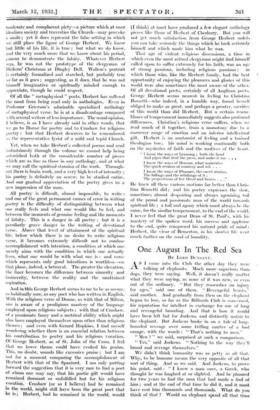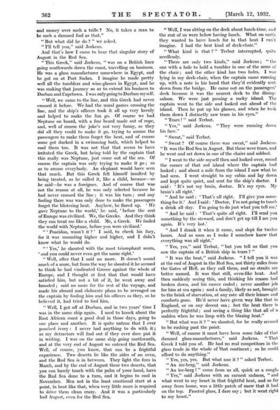One August In The Red Sea
Br Loan DUNSANY.
AS I came into the Club the other day they were talking of elephants. Much more sagacious than dogs, they were saying. Well, it doesn't really matter what they were saying, as none of it was new, or even out of the ordinary. " But they remember an injury for ages," said one of them. " Revengeful beasts," said another. And gradually from then on the elephant began to lose, so far as the Billiards Club is concerned, his reputation for intellect in exchange for one of long and revengeful brooding. And that is how it would have been left but for Jorkens, and distinctly unfair to the elephant. But Jorkens broke in on a tale-of long- :brooded revenge over some trifling matter of a bad orange, with the words " That's nothing to men." -
" Men ? " we said, surprised at such a comparison. " Yes," said Jorkcns. " Nothing to the' way they'll brood and revenge themselves."
We didn't think humanity was as petty as all that. Why, to be humane means the very opposite of all that sort of thing. And so we said. And Jorkens, to prove his point, said : " I knew a man once, a Greek, who thought he was laughed at or slighted. And he planned for two years to fool the man that had made a fool of bitn ; and at the end of that time he did it, and it must have cost him thousands and thousands. What do you think of that ? Would an elephant spend all that time and money over such a trifle ? No, it takes a man to be such a damned fool as that."
" But what did he do ? " we asked.
" I'll tell you," said Jorkens.
And that's how" I came to hear that singular story of August in the Red Sea.
" This Greek," said Jorkens, " was on a British liner going southwards down the coast, travelling on business. He was a glass manufacturer somewhere in Egypt, and he got on at Port Sudan. I imagine he made pretty well all the tumblers and wine-glasses in Egypt, and he was making that journey so as to extend his business to Durban and Capetown. I was only going to Durban myself.
" Well, we came to the line, and this Greek had never crossed it before. We had the usual games crossing the line, and the ship's officers took it all up very keenly and helped to make the fun go. Of course we had Neptune on board, with a fine beard made out of rope, and, well of course the joke's not very funny, so they did all they could to make it go, trying to amuse the passengers to make them forget the heat, and of course some got ducked in a swimming bath, which helped to cool them too. It was not that that seems to have irritated the Greek, but being told by the captain that this really was Neptune, just come out of the sea. Of course the captain was only trying to make it go ; so as to amuse everybody. An elephant would have seen that much. But this Greek felt himself insulted by being treated, as he called it, like a child, because—as he said—he was a foreigner. And of course that was not the reason at all, he was only selected because he had never crossed the line ; it was his turn ; and any fooling there was was only done to make the passengers forget the blistering heat. Anyhow, he flared up. We gave Neptune to the world,' he said, before the rest of Europe was civilized. We, the Greeks. And they think they can treat me like a child. Me, a Greek. We fooled the world with Neptune, before you were civilized.'
" Poseidon, wasn't it ? ' I said, to check his fury, for it was mounting higher and higher, and I didn't know what he would do.
" Yes,' he shouted with the most triumphant scorn, ' and you could never even get the name right.'- - " Well, after that I said no more. It doesn't sound much of a score, but from the way he shouted it he seemed to think he had vindicated Greece against the whole of Europe, and I thought at first that that would have satisfied him, but not a bit of it, he went away and brooded ; said no more for the rest of the voyage, and made his absurd and .elaborate plans to be revenged on the captain by fooling him and his officers as they, as he believed it, had tried to fool him.
" Well, I got off at Durban, and in two years' time I was in the same ship again. I used to knock about the East African coast a good deal in those days, going to one place and another. It is quite untrue that I ever poached ivory : I never had anything to do with it ; as my detractors will find out if they ever dare put it in writing. I was on the same ship going northwards, and at the very end of August we entered the Red Sea. Well, of course, you know, that can be a frightful experience. Two deserts lie like the sides of an oven, and the Red Sea is in between. They light the fires in March, and by the end of August these two deserts, that you can barely touch with the palm of your hand, haVe the Red Sea done to a turn, and it begins to cool in November. Men not in the least emotional start at a point, in heat like that, when very little more is required to drive them clean crazy. And it was a particularly bad August, even for the Red Sea.
" Well, I was sitting on the deck about lunch-time, and the rest of us were below having lunch. What on earth they wanted to have lunch for in that heat I can't imagine. I had the best kind of deck-chair."
" What kind is that ? " Terbut interrupted, quite needlessly.
" There are only two kinds," said Jorkens ; "the one with a hole to hold a tumbler in one of the arms of the chair ; and the other kind has two holes. I was lying in my deck-chair, when the captain came running up, with a note in his hand that they'd evidently sent down from the bridge. He came out on the passengers' deck because it was the nearest deck to the dining. saloon. We were just passing a rocky island. The captain went to the side and looked out ahead of the island. Then he put up his glasses, and when he took them down I distinctly saw tears in his eyes."
" Tears ! " said Terbut.
" Yes," said Jorkens. " They were running down his face."
" Sweat," said Terbut.
" Sweat ? Of course there was sweat," said Jorkens. " It was the Red Sea in August. But these were tears, and he went and sat down in one of-the chairs and sobbed.
" I went to the side myself then and looked over, round the corner of that red island where the captain had looked ; and about a mile from the island I saw what he had seen. I went straight to my cabin and lay down and kept quite quiet, and sent for the ship's doctor. I said : ' It's not my brain, doctor. It's my eyes. My brain's all right.'
" And he said : That's all right. I'll give you some- thing for it.' And I said: Doctor, I'm not going to touch a drink all day. I'm going to do just what you tell me.'
" And he said : That's quite all right. I'll send you something by the steward, and don't get up till I see you again. It's. very hot.'
" And I drank it when it came, and slept for twelve hours. And as soon as I woke I somehow knew that everything was all right."
" Yes, yes," said Terbut, " but you tell us that you saw the captain of a British ship in tears ? "
" It was the heat," said Jorkens. " I tell you it was at the end of August in the Red Sea, not thirty miles from the Gates of Hell, as they .call them; and no straits are better named. It was that still, oven-like heat. And then suddenly seeing this, and thinking his reason had broken down, and his career ended ; never another job for him at sea again ; and a family, likely as hot-brought to the brink of starvation, at any rate all their leisure and comforts gone. He'd never have given way like that in England, or on any decent sea ; but the heat there is perfectly frightful ; and seeing a thing like that all of a sudden when he was limp with the blazing heat."
" But what was it ? " we shouted, for he really seemed to be rushing past the point.
" Well, of course it must have been some fake of that damned glass-manufacturer," said Jorkens. " That Greek I told you of. He had no real competitors in the glass trade in the whole of that continent ; so he could afford to do anything."
" Yes, yes, yes. But what was it ? " asked Terbut.
" An ice-berg," said Jorkens.
" An ice-berg I " came from us all, quick as a cough: " Yes," said Jorkens with an earnest sadness, " and what went to my heart in that frightful heat, and so far away from home, was a little patch of snow that it had on the top. Frosted glass, I dare say ; but it went right to my heart."



















































 Previous page
Previous page